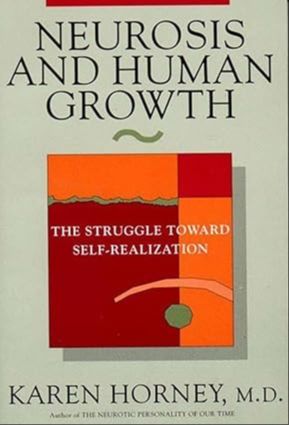Karen Horney MD
“To find a mountain path all by oneself gives a greater feeling of strength than to take a path that is shown.”
Influence on SDC Framework Focus
Karen Horney’s concept of the"tyranny of the shoulds" highlights how personal and social expectations can conflict with an individual’s authentic self. She describes a painful self-view shaped by three perspectives: the ideal self—an unrealistic and unattainable image of who one believes they "should" bel, the actual self—one’s true being encompassing the potential for growth, happiness, and self-actualization, and the despised self—an internalized negative self-view that emerges due to a perceived inability to meet the standards of the idealized self.
The "tyranny of the shoulds" reinforces this dynamic between these self-views, producing thoughts like, "I should be [this or that], but I am not," which perpetuate inadequacy and self-contempt. This cycle highlights how neurotic tendencies arise when individuals lose connection with their real selves in pursuit of an idealized image.
In the SDC Framework, this distinction—between the state one is currently experiencing and the state a person believes they should be experiencing—is an opportunity for increased self- awareness and a point of practice. Horney’s insights into the "tyranny of the shoulds" inform SDC’s approach to examining practical constraints, personal preferences, and the power to shape outcomes.
By recognizing the difference between imposed expectations and authentic possibilities, individuals can establish a more useful sense of direction—one based on the actual rules and opportunities within a given situation rather than unrealistic or self-defeating standards.
Dr. Horney’s work promotes a sense of possibility and freedom by challenging the negative self-concept created by the "tyranny of the shoulds" and allowing for a more constructive and empowering self-view. SDC builds on this by providing a sense of direction that is realistic, well-considered, stated in the positive, and useful for strengthening positive expectancy, self-efficacy and positive self-regard.
For an even closer look, add Dr. Horney’s “Neurosis and Human Growth” to your library today. Find it here in the ChangeWorks Bookstore.
Bookstore
Key Contributions and Concepts
Karen Horney was a pioneering psychoanalyst who expanded the field of psychoanalysis by challenging Freudian theories and integrating feminist perspectives. Her theory of neurosis emphasizes the role of basic anxiety and neurotic trends in shaping behavior. Horney's concepts of neurotic needs and the "tyranny of the shoulds" highlight how individuals develop coping strategies and idealized selves that hinder genuine self-realization. Her work continues to influence contemporary psychotherapy, particularly in understanding personality disorders, interpersonal relationships, and the impact of cultural norms on mental health.
Feminist Contributions to Psychoanalysis
Karen Horney’s feminist contributions directly challenged Freud’s theories, particularly his concept of penis envy. She argued that women’s psychology is shaped not by biological deficiency but by the social and cultural devaluation they experience in their roles and expectations.
Instead of accepting Freud’s assertion that women feel inherently inferior due to a lack of male anatomy, Horney flipped the perspective, proposing that men experience womb envy—a deep-seated envy of women’s ability to create and nurture life. She suggested that some aspects of male-dominated culture and institutions reflect an unconscious compensation for this envy, manifesting in efforts to control or diminish women’s power.
Horney emphasized the need to understand women’s experiences within the framework of societal pressures rather than innate biological drives, laying the groundwork for feminist psychology.
Dr. Horney’s insights continue to influence contemporary discussions on gender, identity, and the psychological effects of cultural conditioning. By shifting the focus from supposed biological deficiencies to the real impact of societal structures, Horney’s work promotes a more accurate and empowering understanding of human development.
Theory of Neurosis
In Karen Horney's theory of neurosis, neurotic behavior comes from coping mechanisms used to manage basic anxiety and feelings of inadequacy.
Unlike Freud, who focused on sexual repression, Horney looked to something very different as the basis of neurosis—social and cultural factors, particularly those related to interpersonal relationships and family conditions.
Horney suggested that individuals with neurosis develop strategies or "neurotic trends" to cope with these feelings, such as seeking affection, power, or independence.
The key principles of Horney's neurosis theory include:
Basic anxiety: This is the root cause of neurosis and is a pervasive feeling of being helpless, small, and insignificant, often resulting from adverse family conditions or social environments.
- Horney's concept of basic anxiety evolved as she observed how early interpersonal experiences shape adult neuroses.
- Horney found that various interpersonal experiences including direct or indirect domination, indifference, erratic behavior, or lack of respect for individual needs lead to anxiety; unlike Freud who thought that anxiety was the result of biological drives.
- For Horney basic anxiety leads to inner conflicts as individuals develop neurotic trends to cope with their feelings of insecurity.
Neurotic needs and trends: Horney identified ten neurotic needs, which are excessive or irrational needs developed to cope with anxiety. These include needs for affection, recognition, and perfection. Horney later grouped these 10 neurotic needs into three trends:
- moving toward people (e.g., seeking affection),
- moving away from people (e.g., seeking independence), and
- moving against people (e.g., seeking power).
The three trends provide a framework for understanding how individuals cope with basic anxiety, and represent exaggerated strategies used to manage basic anxiety.
The Tyranny of the Shoulds
To escape feelings of inadequacy, neurotic individuals construct an idealized self—an unrealistic, grandiose image of perfection (e.g., "I should be liked by everyone," "I should never fail"). The "tyranny of the shoulds" enforces this idealized self through rigid internal dictates:
- Unrealistic demands: "I should always be productive," "I should never feel hurt."
- Moral imperatives: "I must be perfectly selfless," "I should never need help."
These "shoulds" are inflexible and disconnected from the individual’s authentic emotions and capabilities, creating a rift between the real self (their true feelings and potential) and the idealized self.
Horney outlined the "tyranny of the shoulds" as it unfolds and inhibits personal growth as follows:
- Idealized self vs. real self: The pursuit of an idealized self stifles the expression of one's real self, leading to frustration and self-doubt.
- Inner dictates: The "shoulds" are described as relentless inner dictates for thinking, feeling, behaving.
- Neurotic consequences: The pursuit of these ideals can lead to neurotic behaviors, as individuals become trapped in a cycle of self-criticism with the failure to meet expectations.
Impact on personal growth: The "tyranny of the shoulds" diverts energy away from authentic self-expression.
Biography
Karen Horney was born on September 16, 1885, in Blankenese, Germany, to a sea captain father, Berndt Wackels Danielsen, and his wife, Clotilde Gosslien. She demonstrated a strong interest in science from an early age and decided to pursue a career in medicine around the age of 12. Horney enrolled in the University of Freiburg Medical School in 1906, one of the few institutions admitting women at that time. She later transferred to the University of Göttingen and finally to the University of Berlin, where she completed her medical degree in 1911.
Horney married Oskar Horney, a social scientist and economist in 1909. The couple had three daughters, but their marriage suffered because of financial difficulties and health issues, which led to their separation in 1926.
During this period, Horney began her psychoanalytic training with Karl Abraham, a prominent figure in the Berlin Psychoanalytic Society.
In 1920, Horney became a member of the Berlin Psychoanalytic Institute, where she worked as an analyst and teacher. Her involvement with psychoanalysis deepened, and she eventually moved to the United States in 1932, accepting an invitation from Franz Alexander to join the Chicago Institute for Psychoanalysis.
Horney later relocated to New York, where she taught at the New School for Social Research and the New York Psychoanalytic Institute. However, her divergence from traditional Freudian theories led to her expulsion from the New York Psychoanalytic Institute in 1941.
Horney went on to co-found the Association for the Advancement of Psychoanalysis and established the American Institute for Psychoanalysis, serving as its dean until her death in 1952. Her legacy as a pioneering psychoanalyst and feminist continues to influence contemporary psychology.
Horney's career was marked by her early involvement in psychoanalysis and her eventual departure from traditional Freudian theories. She was one of the first women to practice psychoanalysis and was instrumental in developing feminist psychology. Her work emphasized the role of social and cultural factors in shaping personality and neurosis, rather than solely biological drives.
In the United States, Horney became a prominent figure in psychoanalytic circles, teaching at various institutions and establishing her own psychoanalytic organization. Her critiques of Freudian theory led to controversy but also paved the way for new perspectives on human behavior and mental health.
Although Karen Horney passed away on December 4, 1952, her work continues to impact the mental health community. The American Institute for Psychoanalysis, which she co-founded, remains active and her theories continue to influence contemporary psychotherapy, particularly in the fields of interpersonal relationships and feminist psychology. The Karen Horney Clinic, established in 1955, offers training and psychoanalytic services, further extending her legacy.
Book Store
The Neurotic Personality of Our Time (1937; W.W. Norton & Company)
- This book presents Horney's theory of neurosis, emphasizing the role of social and cultural factors in shaping personality.
New Ways in Psychoanalysis (1939; W.W. Norton & Company)
- Horney critiques traditional psychoanalytic theory, arguing for a more inclusive approach that considers social and cultural influences.
Self-Analysis (1942; W.W. Norton & Company)
- This work provides guidance on how individuals can engage in self-analysis to understand their neurotic patterns and move towards self-realization.
Our Inner Conflicts (1945; W.W. Norton & Company)
- Explores the inner conflicts that arise from basic anxiety and neurotic trends.
Neurosis and Human Growth: The Struggle Toward Self-Realization (1950; W.W. Norton & Company)
- This book encapsulates Horney's theory of neurosis, emphasizing the potential for personal growth and self-realization.
Feminine Psychology (1967; W.W. Norton & Company)
- A collection of essays critiquing Freudian views on women and emphasizing the role of social and cultural factors in shaping female psychology.


